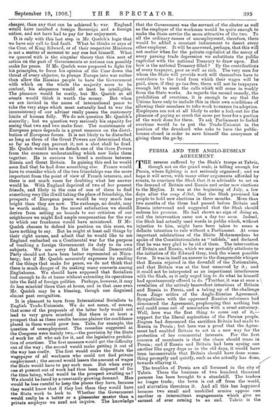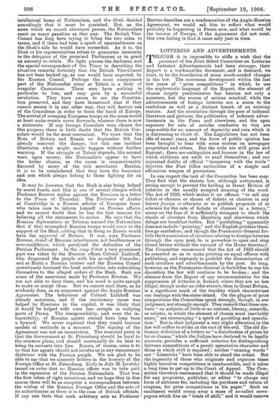PERSIA AND THE ANGLO-RUSSIAN AGREEMENT.
THE reverse suffered by the Shah's troops at Tabriz, though not on the grand scale, is telling enough for Persia, where fighting is not seriously organised ; and we hope it will serve, with many other arguments afforded by events, to convince the Shah that it is advisable to act on the demand of Britain and Russia and order new elections to the Mejliss. It was at the beginning of July, a few days after the coup daat, that the Shah promised his people to hold new elections in three months. More than two months of the three had passed before Britain and Russia intervened and suggested that the Shah should redeem his promise. He had shown no sign of doing so, and the intervention came not a day too soon. Indeed, ' the Shah had actually used words in public which, without injustice to him, might have been taken to mean a definite intention to rule without a Parliament. At some important celebrations of the Shiite Mohammedans he spoke of the Constitutionalists as " infidels," and declared that he was very glad to be rid of them. The intervention of Britain and Russia, which we may probably attribute to the initiative of Sir Edward Grey, took the wisest possible form. It was in itself an answer to the disagreeable whisper that Russia rejoiced in the downfall of the Nationalists, and that Britain was at the best unmoved by it ; and it could not be interpreted as an impertinent interference with the Shah, as it only urged hi to do what he himself had spontaneously offered to do. urther, it was at once a, \ 101 revelation of the actively benevo ent intentions of Britain and Russia in Persia, and a taking up of the challenge from Jingo critics of the Anglo-Russian Agreement. Sympathisers with the oppressed Russian reformers had denounced the Agreement, prophesying that nothing but evil could come out of association with a cruel autocracy. Well, here was the first thing to come out of it,— stipport for the liberal aspirations of the Persian people. Jingoes had denounced the sacrifices Britain had made to Russia in Persia ; but here was a proof that the Agree: ment had enabled Britain to act in a new way for the protection of her commercial interests. For the first concern of merchants is that the chaos should cease in Persia; and if Russia and Britain had been eyeing one another like angry dogs as in the old days, it would have been inconceivable that Britain should have done some- thing promptly and quietly, such as she actually has done, ,.." towards allaying it.
The troubles of Persia are all focussed in the city of Tabriz. There the business of two hundred thousand persons has been brought to a standstill. The traders no longer trade; the town is cut off from the world, and starvation threatens it. And all this has happened because two small and unskilled armies oppose one another in intermittent engagements which give no earnest of ever coining to an end. Tabriz is the intellectual home of Nationalism, and the Shah decided accordingly that it must be punished. But, as the news which we record elsewhere proves, the Nationalists exact as many penalties as they pay. The British Vice- Consul has long been trying to bring the two sides to terms, and if there had been a spark of reasonableness on the Shah's side he would have succeeded. As it is, the Shah or his representatives refuse to guarantee immunity to the delegates of the promised Parliament or to grant an amnesty to rebels. No light pierces the darkness, and the special correspondent of the Times in describing the situation remarks forlornly that the British Vice-Consul has not been backed up, as one would have expected, by the Russian Consul. Perhaps the most conspicuous part of the Nationalist army at Tabriz is a body of irregular Caucasians. These men have nothing in particular to lose, and may gain by a successful revolution. They have sworn to see the Constitu- tion preserved, and they have threatened that if they cannot secure it in any other way, they will destroy one of the Consulates in order to force the hand of Europe. The arrival of avenging European troops on the scene would at least make events move forwards, whereas there is now a stalemate. If any foreign Consulate were chosen for this purpose, there is little doubt that the British Con- sulate would be the most convenient. We trust that the Note of Britain and Russia on September 8th has already removed the danger, but this one incident illustrates what might easily happen without further warning. If the struggle at Tabriz depends, like normal wars, upon money, the Nationalists appear to have the better chance, as the cause is unquestionably financed by many of the rich merchants. Besides, it is to be remembered that they have the buoyancy and zest which always belong to those fighting for an idea.
It may be, however, that the Shah is also being helped by secret funds, and this is one of several charges which Professor Browne makes against the Russians in a letter to the Times of Thursday. The Professor of Arabic at Cambridge is a Persian scholar of European fame who takes care to inform himself on Persian affairs, and we cannot doubt that he has the best reasons for believing all the statements he makes. He says that the Russian diplomatists at Teheran warned the Nationalists that if they triumphed Russian troops would come to the support of the Shah, adding that in doing so Russia would have the approval of Britain. It was, says Professor Browne, dread of Russian interference, not heedlessness or over-confidence, which paralysed the defenders of the Persian Parliament. In the coup d'etat a very prominent part was taken by the Russian officer, Colonel Liakhoff, who dragooned the people with his so-called Cossacks ; and at Rasht a Russian cruiser and the Russian Consul gratuitously hectored the local authorities into submitting themselves to the alleged orders of the Shah. Such are some of the assertions made by Professor Browne. We are not able to deny them, and his word is quite enough to make us accept them. But we cannot read them, as he evidently does, as an argument against the Anglo-Russian Agreement. The behaviour of Colonel Liakhoff was already notorious, and if the reactionary cause was helped by Russians in the capital, it was likely that it would be helped with even less scruple in outlying parts of Persia. The irresponsibility, and even the in- tractability, of Russian agents abroad have long been a byword. We never expected that they would become models of rectitude in a moment. The signing of the Agreement was not an incantation. The essential point is that the Government at St. Petersburg should be loyal to the common plans, and should continually do its best to bring its servants into line. Russia, of course, owes it to us that her agents should not involve us in any unnecessary disfavour with the Persian people. We are glad to be able to say that we sincerely believe in the honesty of the Foreign Office at St. Petersburg. Early in July M. Isvolsky issued an order that no Russian officer was to take part in the repression of the Persian Nationalists. That was the first token of right intentions, and we hope that in due course there will be as complete a correspondence between the wishes of the Russian Foreign Office and the acts of its subordinates as there is in the case of British officials. If any one feels that such arbitrary acts as Professor Browne describes are a condemnation of the Anglo-Russian Agreement, we would ask him to reflect what would probably be happening in Persia now, and what would be the tension of Europe, if the Agreement did not exist. Our own feeling is that it came only just in time.











































 Previous page
Previous page